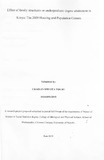| dc.description.abstract | Numerous studies have been conducted in the area of social science trying to establish what
influences education attainment for children. These studies have sort to address areas ranging
from the mode of delivery during teaching to social background factors that determine education
attainment of a child. In areas touching on social background factors that influence education
attainment for children, Family Structure has featured prominently in many studies across
different countries.
Studies on the effect of Family Structures on education attainment have however been focusing
on intact versus non-intact Family Structures. This particular study strives to go further than just
the two broad categories and explore the effect of the various Family Structures existing in
Kenya on numbers attaining undergraduate studies.
Making use of the 2009 Kenya National Housing and Population Census, the study goes deeper
to evaluate the effect of six existing Family Structures in Kenya on education attainment for
usual members of a household while also considering the family size, social economic status of
the household and educational level of household head.
To establish effects of Family Structures on education attainment, counts of those usual members
of a household who had completed undergraduate studies from the various family structures was
obtained and regressed using Poisson regression and zero-inflated Poisson models while
considering and not considering family size, Social economic status of a household and highest
educational level of household head.
The study finds that significant differences exists In number of those who have attained
undergraduate studies from the different Family Structures in Kenya. Polygamous, Widowed and
Divorced Family Structures affected education attainment on equal measure; that is there is no
significance difference in the effect of these Family Structures on education attainment.
Children from Separated family structures are the most affected.
A deviation from most of previous findings is witnessed in this study because unlike most of the
other studies that found children from families with both parents excelling better in education, it
is not the case for this study. Effect of Never Married Family Structure on numbers attaining
undergraduate studies is found to be more favorable than effect of Married monogamous Family
structure (intact family). With both parents from a married monogamous struggling to coup with
current harsh economic times whereby they are forced to leave their houses early and return late,
children from these households seem not to be accruing the benefits of having both parents in
their lives.
This study has recommended designing of special programmes by ministry of education which
should include counseling units within schools aimed at mitigating effects of Family Structures
on children's education attainment and particularly children from Separated.... | en |

